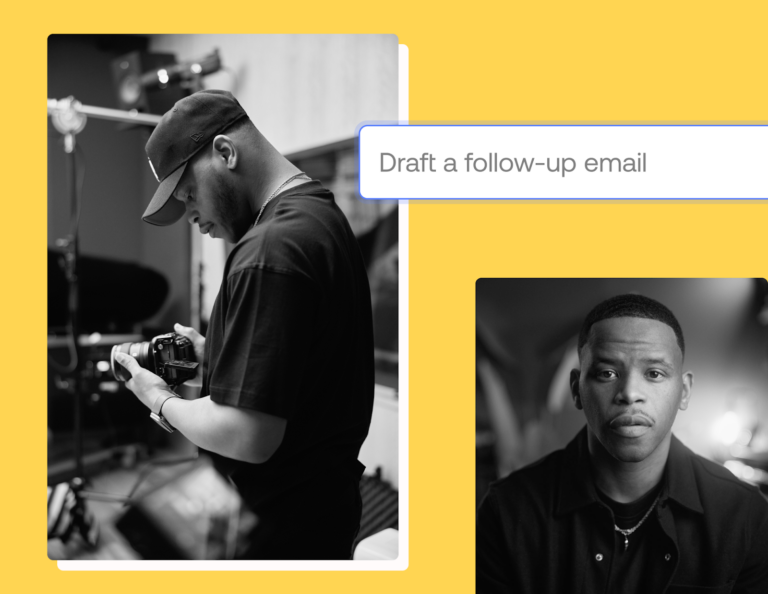When I moved my one-woman business from the Midwest to Southern California, I never had dreams of building a team. I was just passionate about planning weddings, controlling my own schedule, and having the freedom to create my own destiny.
Today, LVL Weddings & Events has grown to a team of 20 coordinators and planners located throughout California, Hawaii, Denver, and Phoenix.

So how can you grow your business? What takes you from 1 person to 20 employees? And how can you maintain your creative vision while you scale your team?
As I reflected on the last few years of continued growth at LVL, I found 5 key principles of building a team.
1. People Over Strategy
When growing your business, it’s extremely important to focus on your people more than anything else.
You can have the best-laid business plans, but if you don’t have the right people in place to execute your vision, you will never achieve your true vision—especially in a creative industry.
So what does hiring the right people mean?
For starters, hire people who compliment your weaknesses, not just a bunch of copies of yourself. Diversity of skill sets, ideas, personalities, and backgrounds will pay off much more than extremely like-minded individuals.
Our team uses a book called StrengthsFinder 2.0. It helps you identify your strengths, allowing you to look at the big picture to discover what kind of people you need on your team to compliment your weaknesses.
In my case, although I’m a planner, I tend to think more about the big picture and creating connections with people. I am not a process person or manager. I’ll be the first to tell you that on a wedding day, I’m not a great trainer. I tell my assistants to “just figure it out, follow me around and you’ll learn what to do!” It’s kind of a sink-or-swim mentality.
But when it comes to growing a team—I know that won’t fly. Luckily, I have my business partner Heather. Heather is always the one to ask “what’s next?” to the assistants, and coaches them along to evolve them as planners.
Our complementary strengths allow us to work effectively as a team.
That’s one example of what people over strategy means to me and an important step in building a team.
2. Create and Preserve Your Culture
It’s so important that before you begin to hire people, you think about what kind of culture you want to create.
At LVL, this means asking how we want our wedding business to feel. What kind of client experience do we want brides and grooms to have? What kind of values do we want our team members to have?
We started with a simple statement: “We Believe Perfect Weddings Do Exist.” We thread this into everything we do, letting it guide our business decisions, who we hire, and how we approach every day.
But culture doesn’t happen by accident. To reinforce our company culture, we hold a yearly team retreat where we come together, regroup, and create team comradery.
We also keep our daily lines of communication open so that we’re all on the same page. Through regular check-ins, we create a safe space to give each other feedback, and we really listen to our employees’ suggestions or concerns.
3. Create a Community Mindset
Part of a great culture is being part of a community.
The basic philosophy here at Rising Tide is that “a rising tide lifts all boats.” In other words, if you’re all working together and sharing information, you’ll only lift each other up together and be better as a whole industry.
I attribute adopting this mentality to being the catalyst that grew our team.
About eight years ago, Heather (my now business partner, but back then competition) and I realized there was a true lack of community among wedding planners. In order to create a culture of knowledge sharing within the industry, we created a mastermind group.
While in this group, we read The E-Myth Revisited: Why Most Small Businesses Don’t Work and What to Do About It by Michael E. Gerber. This book was the game changer for the trajectory of LVL.
This book theorizes that there are three different types of workers:
- The Entrepreneur: a future-focused visionary who pursues opportunities
- The Manager: a past-focused worrier who plans and organizes
- The Technician: a present-focused worker who concentrates on the task at hand
Gerber claims that not all people who start businesses are entrepreneurs, and that not all technicians are fit to run a business—as these two skill sets are extremely different.
In reading this book, I identified myself as the entrepreneur. Heather saw herself as a technician. Heather wanted to plan weddings, not run a business. I wanted to focus on the business as an entrepreneur.
We discovered we would actually be stronger together than we would be competing with one another. Because we had created a space to be honest with each other and ourselves through our mastermind group, we were able to identify our personal strengths and weaknesses. This created more opportunities for the both of us than we ever would have going at it alone.
The moral of this story:
To grow your team, stay open to new ideas and opportunities—even if it means collaborating with your competitors. Continue to meet with other entrepreneurs inside and outside your industry. Encourage your team members to be part of knowledge sharing groups that interest them. Share information freely. Encourage curiosity.
Don’t be afraid to get out there and create community over competition, and raise each other up.
4. Use Technology To Scale Your Business
When you’re first growing your business, it can be tempting to avoid paying for tools or technology because you’re trying to keep your profit margins up.
But especially in a business where your creativity is everything, you need to take advantage of every opportunity to make time-consuming tasks easier.
Until recently, the wedding industry had really outdated systems—nothing for the modern couple or planner.
Enter Aisle Planner and HoneyBook!
Aisle Planner has allowed us to scale our marketing, sales, and project management processes, while Honeybook’s client management software for small businesses has allowed us to simplify our online contracts, online invoices, and payments.
Leveraging both of these systems has given us the ability to build a team, because everyone is operating on the same systems. By streamlining our operations with technology, it helps us keep consistency, process, and quality with all of our team members.
Keep your eye open for new tools as they come available, but don’t chase every shiny new object. Value whatever tool will ultimately save you time.
5. Embrace Change and Growth
The beauty of when you finally are in a place where you’ve hired the right people, laid the groundwork for an amazing culture, created a community mindset, and put your systems in place, you’re ready to watch your team blossom and grow.
But the work is never done. Your business will always change and new challenges will always pop up. But if you’ve laid the foundation correctly, you’ll be able to address these new challenges and seize new opportunities as they arise.
As the business owner, it’s your role to keep the vision clear while encouraging your team to keep growing. So embrace that role wholeheartedly!
Other Questions When Building a Team
Even if you have the best intentions, the path to growing will be a bumpy one! Here are some questions that I’ve been asked by other business owners who are trying to grow their team, and how we addressed them at LVL.
How do you know what role to add next to your growing team?
Look at the leads coming in. Where do you see a need?
If you are receiving leads for full planning, look to hire an experience planner. If you are getting coordination inquiries, look for someone who has some experience in this area and can just use more weddings under their belt before taking on a more luxury client.
Ultimately, hire for the future.
If you’re not ready to hire a lead planner or coordinator at the moment, you may need them a year from now, so bringing them on in an assistant role helps them gain experience under your brand and prepares them for their own future wedding clients.
How do you compensate your team members?
You should first consult with your lawyer and accountant to lay the groundwork for paying your team.
In my experience, you have to make all your staff employees. Classifying as a contractor is not a good idea. I only say this because I have learned from my past mistakes.
Our employees are either paid hourly or salary with bonus incentives depending on their position.
How do you deal with team members who leave your team to branch off on their own?
Make sure you have a well-written employee contract drafted by a lawyer to protect you from any sticky situation when a team member leaves.
For example, in a creative business, team members often want to use some examples of their past work (under your brand) to promote their new competitor business. In your employee agreement, include language safeguarding you and proprietary information.
Is it a disappointment when team members leave? It can be. But in the end, this is the circle of life. If your team isn’t growing and evolving, neither is your company.
Although the time you spent training them is lost, if they weren’t a good fit for your company, it may end up being ideal for everyone to go their separate ways.
Or maybe they were a great fit, and you neglected their ambitions. Perform an exit interview to see what went wrong (although it could be that everything went right)! Take employee turnover from your star performers as a sign that you need to improve your employee engagement process and stay on top of your employees’ career goals.
As you’re building a team, how do you balance someone with a great attitude but a lower skill set, or vice versa?
First and foremost, if a team member has a high skill set but a bad attitude—they’re likely done. You can’t change someone’s personality. If you have a strong enough company culture, you may be able to overcome a few highly skilled team members who aren’t culture fits, but it’s typically a losing battle.
In our business, so much of wedding planning is psychology—dealing with so many different types of people and personalities. To have to use energy dealing with a bad personality on our team is too risky for a small business owner.
Yet another lesson we learned the hard way at LVL…
On the flipside, you can develop the skills of someone with a great attitude. With enough patience on your end, they will ultimately grow with your business and develop their career under your brand.
My business partner Heather is great at training our assistants and planners who need more mentorship while I focus on building the brand and the business side of things. Our personalities complement each other, allowing us to continue to expand and manage our team successfully.
Once your business grows, will clients be disappointed if they don’t get to work with you, the business owner? How do you sell them on that?
If a client chooses to hire your company but doesn’t get to work with you, and instead is assigned another team member, there can be some confusion or disappointment that the client isn’t getting you—the face of the business. That’s who they saw on Instagram, after all.
But as your creative business grows, you simply can’t work with every client. You’re only one person. Delegating projects to your team of planners and coordinators is a necessary part of growing.
Getting clients excited about working with other team members is simply a shift in sales technique.
Sell the company as a whole and let them know you’ll match them with a team member who is the best fit for their particular wedding. We assure our clients that no matter who they work with at LVL, all team members are trained consistently to produce the same quality weddings across the board.
That’s where hiring great people comes back into play. If you hire people who are dedicated to your collective vision, your services should transfer seamlessly from one team member to the next.
If a client does insist on hiring you, let them know your rates are at more of a premium as the owner, since you can only take a limited number of weddings annually.
You can do this!
To end on a positive note: you can do this. If you’re reading this blog, it means that you care about building and growing your team with love.
If you have any questions about growing your team, drop your question in the comments or reach out to us at Planner Life Academy.



